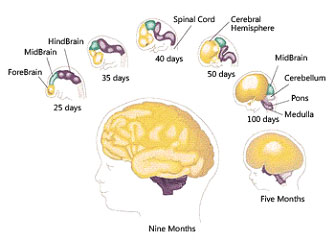Healthy Brain, Lots of Gain.
The human brain is the command center for the nervous system. It enables thought, memory, movement and emotions by a complex function that is the highest product of biological evolution.

Some trivia about the brain:
- The weight of an adult human brain varies in the range of 1,200 – 1500 g and it has approximately one trillion cells. The brain weight is about 2% of our entire weight.
- The brain takes up around 20% of the blood, oxygen and calories needed by the body. In terms of volume, it takes up 1400 cc.
Maintaining a healthy brain during one’s life is the uppermost goal in pursuing health and longevity. Mind, body and health are interrelated. Fitness of body is achieved through healthy diet, exercise and habits.
The brain plays a vital role in everything – from learning, working and playing, to personality, aptitude and memory.
As the population ages, the burden of neurological disorders and challenges for the preservation of brain health increase. It is therefore vital to understand what brain health is and why it is important. Healthy lifestyle habits including mental stimulation, physical exercises, good nutrition and stress management are essential. Sleep is another important activity which can improve brain fitness.
The development of the brain has a long trajectory, beginning within a few days after conception and continuing through adolescence and beyond. The nervous system undergoes its most dramatic development during the first few years of life.
There are many stages of brain development:
- Neurogenesis
- Neuronal migration
- Synaptogenesis
- Myelination
- Synaptic pruning
- Neuroplasticity – ability to change structure and function in response to environmental cues

The brain grows rapidly during the initial childhood years. The number of synapses for every neuron when a child is born is around 2,500. At 3 years of age, this increases to 15,000 but drops to half of this number in adulthood. Synaptic pruning takes place wherein the old weak connections are pruned and the brain changes to adjust according to the environment.
Thus, as the child grows, we not only provide good education but also create an environment for the holistic development of the child. This includes extracurricular activities too.
These activities constantly stimulate the child and help them grow into a whole person.
It improves academics and pro-social behaviour and reduces behavioural issues and emotional problems.
Human ageing is mainly reflected in the aspects of brain ageing and degradation of brain function. The number of people aged 60 years and over worldwide was around 900 million in 2015 and is expected to grow to two billion by 2050. With the increase in population ageing and growth, the burden of neurological disorders and challenges to the preservation of brain health steeply increase. People with neurological disorders will have physical disability, cognitive or mental disorders, and social dysfunction and will be a large economic burden.
There are a lot of conditions that can impact brain health. These diseases and disorders include:
- Vascular diseases like stroke
- Degenerative diseases like dementia
- Brain injuries
- Inflammation or infection
- Malnutrition and vitamin deficiencies
- Immune-mediated diseases
- Mental health
Brain plasticity refers to the brain’s ability to change structure and function. This ties into that old phrase, “if you don’t use it, you lose”. Cortical remapping is the brain’s ability to change and adapt as a result of experience.
Activities to promote neuroplasticity:
- Learn new things every day: whole-brain thinking
- Practice focused attention
- Explore with childlike wonder
- Exercise regularly
- Avoid alcohol, smoking and drugs
- Practice positive forward thinking
Brain fitness can be measured physically at the cellular level by neurogenesis and increased functional connections of synapses and dendrites between neurons. It can also be evaluated by behavioral performance as seen in improved memory, attention, concentration, executive functions, decision making, mental flexibility and other core capabilities.
Keeping our mind and body healthy is our responsibility. There are a few activities we can perform in order to maintain a healthy brain:
- Time for relaxation
- Connection with others
- Have a hobby
- Sense of humour
- Healthy diet
- Good sleep
- Keeping background conditions under control such as diabetes, hypertension and cholesterol and thus reducing the risk of diseases such as stroke and heart attack.
In conclusion, we need to understand that we can take charge to shape up our lives and make ourselves better people, staying stimulated and young at mind always.
Enjoy and cherish this life!!

Dr. Bhuvaneshwari Rajendran
Senior Consultant Neurology and Neurophysiology
Kauvery Hospital, Chennai

